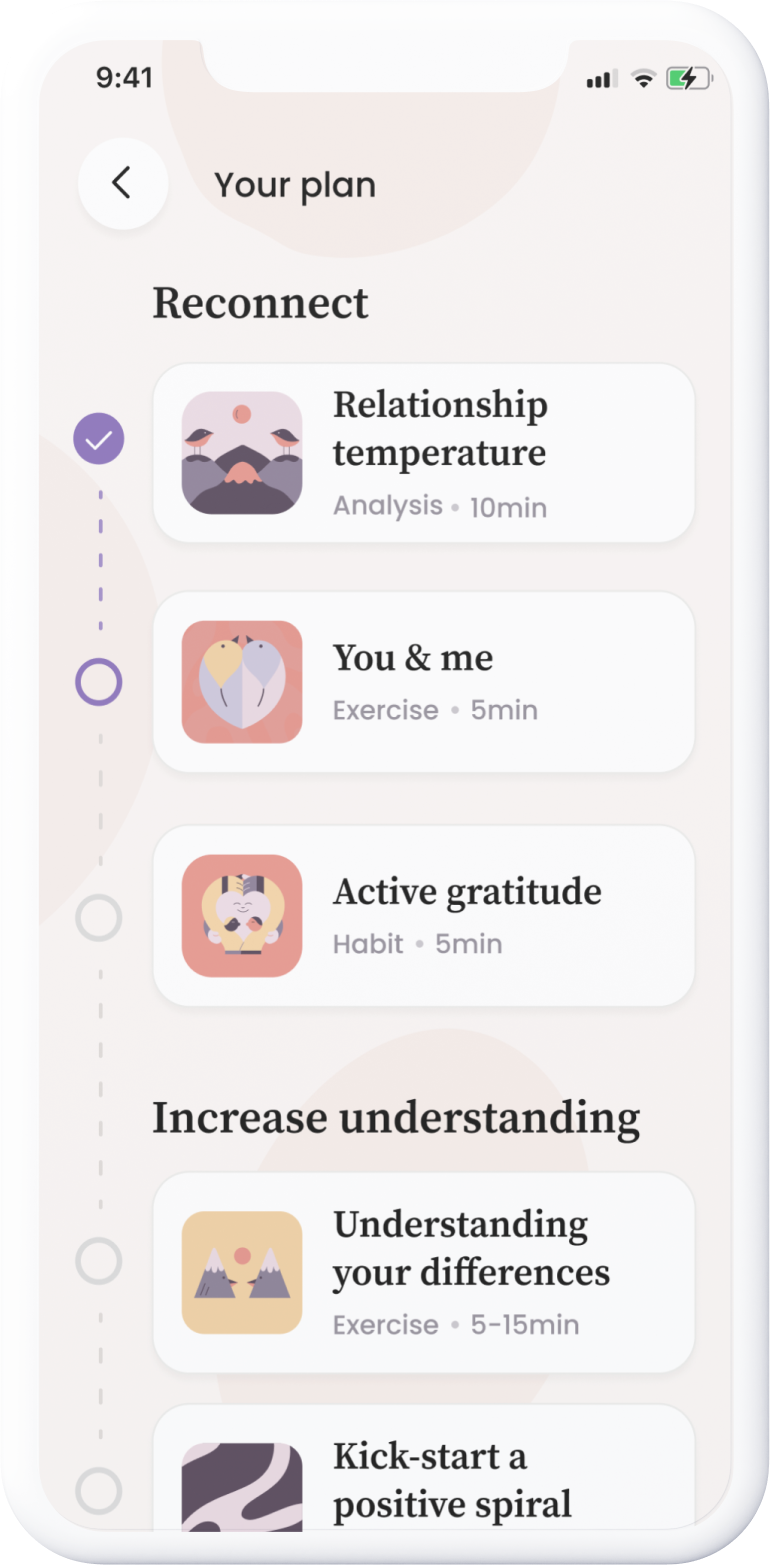How to Stop Arguing With Your Partner
Learn about problematic pattern of interaction- 20 May 2024
- 9min

Do you constantly argue with your partner? Or do your arguments often follow a similar pattern? Do you find yourselves stuck in cycles that leave both of you angry or upset, without actually resolving the underlying issues?
Problematic patterns of interactions underlie many relationship issues. By identifying and beginning to break these patterns, you can learn how to stop arguing with your partner. But also how to manage challenges constructively and maintain an emotional intimacy.
What arguing with partner can look like
You want to make plans for the weekend, but your partner seems uninterested in planning or making decisions. You become irritated (and perhaps disappointed and insecure) - deep down, you don't enjoy planning much either, you just want to have a good weekend, so why doesn't your partner care?
With a harsh tone (harsher than intended), you point out that your partner is always uncommitted and only cares about work, to which they sigh, roll their eyes, and leave the room. The familiar chilly atmosphere sets in.
As difficult as it is to take charge of weekend planning and constantly arguing with your partner about it can be even more stressful - especially if each argument follows the same pattern.
Consequences from arguing with partner
If your partner's responses to conflict - in the example above, one accusing and the other withdrawing - are familiar to you, we can call it a problematic pattern of interaction. It's like a well-rehearsed dance you both engage in, but one that doesn't help - rather, it worsens the situation.
The rehearsed steps you take when things get tough may seem necessary. Pointing out your partner's lack of engagement may feel like the right thing to do. And perhaps you think if you don't highlight your partner's lack of engagement, they will become even more distant. On the other hand, your partner may believe that if they don't distance themselves from the situation (or you), they will drown in criticism.
Your respective actions are attempts from both sides to resolve a difficult situation at the moment. But in the long run, it makes it harder to handle the actual challenge (in this case, differing preferences on weekend planning), and both of you feel misunderstood, taken for granted, inadequate, or simply bad in the eyes of the other. You become angrier or sadder, or maybe both.
Common problematic patterns of interaction when arguing with partner
1. Accusation, Blame, or Attempting to Change
Accusing the other of being wrong or insufficient, holding the partner responsible for a problem that arises in life together, or trying to get the partner to change through various arguments is a common way to act when things feel tough. Simply (more or less consciously) advancing one's own agenda with the goal of having the partner change and become more like oneself, or see things that you do yourself.
2. Withdrawal, Avoidance, or Denial
Another common way is to do the opposite - to distance oneself. In the moment, it may feel much easier than confronting your partner, engaging in an argument, or making yourself vulnerable by expressing that you want or need something different from what your partner wants.
But even if it seems to work in the short term in the sense that there are no arguments with raised voices or harsh words, it may lead to emotional distance - you move away from your partner. Suppressing your feelings or avoiding discussing sensitive topics can create an illusion of peace and harmony in the relationship, but in the long run, it leads to bottled-up emotions and unresolved issues.
3. Clinging, Monitoring, or Imposing
One of the most widespread patterns in relationships is the dynamic that arises when one approaches, seeking closeness and emotional contact by wanting to talk or be physically close, while the other withdraws, often to protect their sense of independence.
It's easy for a negative spiral to occur where both get stuck in their respective roles. The more one seeks closeness, the more the other wants to distance themselves. The more one distances themselves, the stronger the need for emotional contact or a sense of security in the relationship. Perhaps one holds on to their partner, or begins to impose a desire to control and know everything about what their partner is doing or feeling.
Constant arguing with partner and how to break the pattern
The first step in breaking the negative pattern is to step back and try to understand the emotions underlying the surface, both in yourself and in your partner. The key is to look for what is reasonable, what is actually understandable, even when it's not as you would wish or when the behaviour it leads to doesn't feel okay.
The second step is to start acting in the opposite way to what you usually do; in the heat of the moment, it's often about doing the opposite of what your emotions tell you to do. If you mostly want to argue with your partner, you'll likely benefit from taking a break, withdrawing for a while, and reflecting on what you want your partner to understand about you, how you can express yourself so that they will understand it, and most importantly, how you can understand what is happening in your partner.
On the other hand, if you mostly recognize yourself in wanting to withdraw to avoid arguing with your partner or discuss, you may need to practise putting words to what you think and feel, and actually standing up for your needs.
Moving Forward Together
What do your patterns look like? Are you similar or different in how you react when things get tough between you? It's often said that the pattern is symmetrical when both parties act kind of in the same way. For example, by both withdrawing or both escalating the conflict through arguing. On one hand, it may be easier to understand each other if you react in similar ways, but it can also become problematic.
For example, a couple where both approach each other may experience many and strong conflicts and arguments that easily escalate, or a couple where both withdraw from each other may not talk at all about what they really need to sort out.
If you act differently within the couple – one perhaps pushing for further discussion while the other withdraws and wants to avoid further conversation – the pattern is called asymmetrical. It's often difficult to understand each other's reactions if you act differently, and it easily creates a negative spiral where you increase each other's positions.
What is clear - regardless of how the pattern looks in each individual couple - is that both parties in the couple influence each other through their way of acting, which increases the pattern over time and makes it harder to break out of.
Sometimes the conflict pattern also changes over time in the relationship; for some, it becomes so draining when constant arguing with partners and disagreements often lead to conflicts that they instead begin to avoid bringing things up, resulting in perhaps not talking at all.
How the Ally app can help you
In the Ally app, you'll receive help and guidance to understand and work on relationship problems. For example get guidance in how to stop arguing with your partner. Through the exercises in the app, you'll be guided toward a stronger and more equal relationship and you use the app entirely on your own.
Have you and your partner tried the quiz “Identify your patterns”? Identifying and reflecting on your problematic patterns of interactions is the first step toward changing them and get an understanding in how to stop arguing with your partner.
If both you and your partner have taken the quiz, take a moment to sit down together and discuss it. Try to focus on how each of you can become a better partner, rather than telling each other how you wish the other would change. You can start with these questions:
- What do your respective results look like? Do you have similar patterns in how you usually behave in conflicts and arguments, or do they differ between you?
- What do you think are the long-term consequences of often falling into these patterns?
- What would each of you like to do differently the next time it feels difficult between you? And if you succeed - what would it lead to?
- How can you help both yourselves and each other to make a change ("doing the opposite")? How can you increase the chances yourself? Is there anything your partner could consider that would help you do things differently than you usually do?








